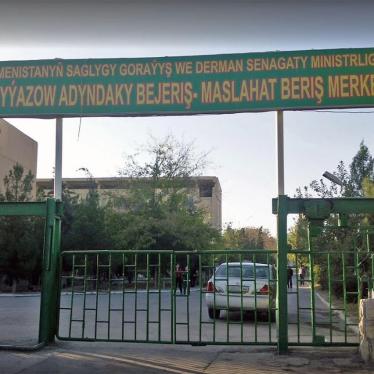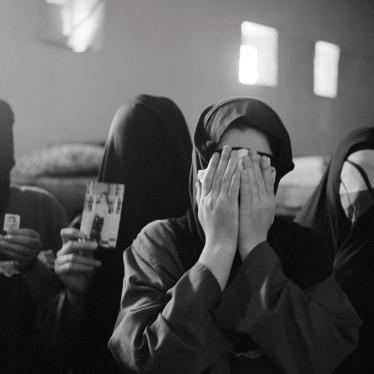Update (October 15, 2020): On October 12, Dorsultan Taganova was released from the Kirklareli Pehlivankoy women’s deportation center. The undersigned groups will continue to monitor her case.
(Berlin) – The Turkish government should halt plans to deport the Turkmen activist Dursoltan Taganova to Turkmenistan, where she will be at grave risk of arbitrary arrest and torture, a group of 11 human rights organizations said today. Turkish authorities should immediately release Taganova from custody.
Turkey’s international partners should call on Ankara to uphold its international legal obligations and not deport Taganova, who is seeking asylum in Turkey, to Turkmenistan.
“Turkmenistan is known to severely harass and punish peaceful critics of the government,” said Hugh Williamson, Europe and Central Asia director at Human Rights Watch. “To return Dursoltan Taganova to Turkmenistan would place her at grave risk of persecution and torture. Turkey should abide by its international obligations not to send her anywhere she could face ill-treatment.”
The 11 groups are Bulgarian Helsinki Committee, Crude Accountability, the Centre for the Development of Democracy and Human Rights, Democratic Civil Union of Turkmenistan, Freedom Files, Human Rights Watch, Institute of Human Rights, the Memorial Human Rights Center, Norwegian Helsinki Committee, Turkmenistan Helsinki Foundation for Human Rights, and the Turkmen Initiative for Human Rights.
Istanbul police detained Taganova, 29, on July 19, 2020, along with dozens of other Turkmen citizens, mostly migrant workers, who intended to join an unauthorized rally that day in front of the Turkmen consulate in Istanbul. The rally aimed to criticize the Turkmen government’s inadequate response to the Covid-19 crisis and to call for President Gurbanguly Berdymukhamedov’s resignation.
Turkmenistan’s extremely oppressive government allows no independent media or human rights scrutiny. The authorities suppress any indication of dissent and political expression and have driven into exile or imprisoned political opposition members, human rights defenders and activists, and independent journalists. The justice system completely lacks independence and transparency. Torture is widespread and dozens of people have been forcibly disappeared in Turkmen prisons, some for more than 18 years. The Turkmen government routinely imposes informal and arbitrary travel bans on various groups, including activists and relatives of exiled dissidents.
The Turkish authorities banned the July 19 rally, citing Covid-19 related requirements. Following a complaint filed by the Turkmenistan consulate, the police arrested about 80 Turkmen citizens, including Taganova, as they gathered outside the consulate building.
Most detainees were released about five hours later. Taganova’s lawyer told Human Rights Watch that she was the only Turkmen citizen whom Turkish authorities kept in custody. The lawyer said the consulate’s written complaint specifically mentioned Taganova. The authorities alleged that she and four other Turkmen citizens had interfered with Turkmen diplomats’ work and threatened violence against them. She was charged under Turkey’s Law on Demonstrations and Public Meetings (Law 2911).
On the same day, Taganova was transferred to the Selimpasa deportation center in Istanbul for “exceeding the duration of [her] visa exemption [stay]…”, for preparing to attend an unauthorized demonstration, and for protesting against Turkey.
Taganova has lived in Turkey since 2011 and her passport expired that year. This made it difficult for her to legally extend her residency permit. She made numerous attempts to renew her passport via the Consulate of Turkmenistan in Istanbul, as prescribed by the Law on Migration of Turkmenistan, but was told that she needed to go back to Turkmenistan. She did not return to Turkmenistan, fearing she would be denied permission to leave.
Turkey is one of very few countries to which Turkmen citizens can travel without a visa for up to 30 days and where they may apply and obtain a residence permit renewal on an annual basis. In recent years, the renewal of Turkmen passports for citizens living abroad has become a serious problem, news outlets have reported. Although international law mandates that states renew passports overseas via respective embassies and consular services, Turkmen diplomats often refuse, telling Turkmen citizens that the new passports can only be issued at their place of residence in Turkmenistan, to compel them to return.
Taganova’s lawyer said that while in administrative detention at the Selimpaşa deportation center at the end of July, she applied to the Turkish migration authorities for asylum. Her application is under review.
On July 20, the Istanbul Provincial Migration Directorate ruled that Taganova should be deported to her country of origin, or a safe third country, for violating visa exemption requirements and because she poses a threat to the public order, health, and security of Turkey. On July 28, Taganova’s lawyer appealed to the Istanbul administrative court, challenging the deportation decision. That appeal is also under review.
On July 23, Taganova’s lawyer applied for her release from administrative detention. On July 27, the Istanbul court rejected the application. Taganova was transferred on October 5 to the Kirklareli Pehlivankoy women’s deportation center, 200 kilometers outside Istanbul.
“Turkish authorities have little basis for keeping Taganova, an asylum seeker, in custody and should immediately and unconditionally release her,” said Tadzhigul Begmedova, director of the Turkmenistan Helsinki Foundation for Human Rights. “Turkish authorities should also ensure that she will not be sent back to Turkmenistan, where she is at serious risk of torture.”
Sending people to a country where they face a real risk of torture is prohibited under international law. Turkey is a party to the 1951 Refugee Convention and its 1967 Protocol, retaining a geographic limitation that excludes anyone not originally from a European country from full refugee recognition. Regardless of any geographic limitation under the Refugee Convention, Turkey must still abide in all cases with the principle of nonrefoulement, which provides that no one may be returned to a country in which they may face persecution.
Turkey also acceded to the United Nations Convention Against Torture in 1998, which obliges states to ensure that they do not send anyone to a place where they face a real risk of torture or other ill-treatment.
The UN Committee against Torture, in its concluding observations on the fourth periodic report of Turkey, in June 2016, raised concern that Turkey maintains a geographic limitation only to people originating from Europe and has violated the nonrefoulement principle under art. 3 of the Convention Against Torture for sending people to countries where they were at risk of torture. The committee has called on the Turkish government to lift the geographic limitation and ensure that “no one is expelled, returned or extradited” to a country where they may risk torture. Turkmenistan routinely harasses and intimidates families of peaceful critics and dissidents abroad, including with physical violence and arbitrary detention.
The groups have received credible reports that Taganova’s family in Turkmenistan may be subjected to serious threats of persecution and intimidation in retribution for her peaceful activism.
“Turkish authorities have an obligation to protect Taganova from the persecution she faces if returned to Turkmenistan,” said Vitalii Ponomarev, Central Asia expert at the Memorial Human Rights Center. “Turkey should also ensure she has access to legal status and to essential services.”









